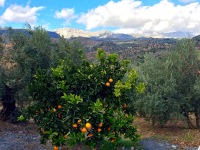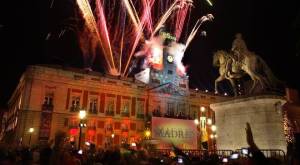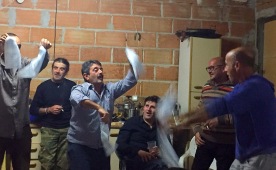Lorenzo picked a red plastic tricycle wheel off the cushion and lowered his not inconsiderable frame into the armchair nearest the fire. He’s a man of few words; he settled himself down, and gazed around. His wife, their seven children, half a dozen of the children’s partners, eleven grandchildren, and a couple of young boyfriends of the teenage granddaughters, plus a random cousin or three, were variously clambering on the backs of the sofas, curling their hair in the bathroom, stirring huge pots on the stove, wiping down plastic chairs, and counting out 32 sets of cutlery.
 It was a scene replicated all over Spain on La NocheBuena(Christmas Eve) and on La NocheVieja (New Year’s Eve). Large extended families, gathering together as they always have, to spend together the significant moments of the year. The tea-towel was lifted from the jamon on its stand, and Juan expertly cut slivers and laid them in circles on ten plates. I took the first plate over to Lorenzo by the fire, and got an appreciative nod.
It was a scene replicated all over Spain on La NocheBuena(Christmas Eve) and on La NocheVieja (New Year’s Eve). Large extended families, gathering together as they always have, to spend together the significant moments of the year. The tea-towel was lifted from the jamon on its stand, and Juan expertly cut slivers and laid them in circles on ten plates. I took the first plate over to Lorenzo by the fire, and got an appreciative nod.
It’s at these events, these special times of the year, that the cultural differences between Spain and the UK are thrown into sharp relief. It feels as though, in Spain, we are back in simpler times, where the pleasure of each other’s company is the most valuable gift. Where expensive presents are unnecessary, and where the menu for the heaving table has not been stressed over for weeks.
I drove out to the campo house of my neighbours, carrying Rafaela and a huge slow-cooker containing chuletas (pork chops in a sauce). We bounced up the rough track, and in the falling light of New Year’s Eve, she pointed out the house on the other side of the main road, that belonged to her son, and then the house we were heading for, belonging to one of her daughters. Slightly further up the track was the house of another son. All the land we were crossing had belonged to her husband, Lorenzo, until he had shared it out amongst the children. These campo houses are not their main homes; all the grown-up children live either in Colmenar or Málaga now. But their campo houses are an important part of their lives, not only as something to hand onto their own children, but also as weekend retreats, where all the family comes together. Pepa’s house was the preferred space for big events such as New Year, as it has the largest dining area. In the summer, any of the houses suffices, as all have big brick barbecues – often built and finished with more care than the houses!
land we were crossing had belonged to her husband, Lorenzo, until he had shared it out amongst the children. These campo houses are not their main homes; all the grown-up children live either in Colmenar or Málaga now. But their campo houses are an important part of their lives, not only as something to hand onto their own children, but also as weekend retreats, where all the family comes together. Pepa’s house was the preferred space for big events such as New Year, as it has the largest dining area. In the summer, any of the houses suffices, as all have big brick barbecues – often built and finished with more care than the houses!
 None of this family’s campo houses are finished. Inside Pepa and Paco’s house the walls remain bare breezeblocks, the roof is unlined, and electric cables hang across doorways. But the fire was blazing, Lorenzo, the patriarch, was in his chair, pots were bubbling on the stove, a small Christmas tree stood in the centre, and the television was showing New Year celebrations from around the world. Nothing was missing.
None of this family’s campo houses are finished. Inside Pepa and Paco’s house the walls remain bare breezeblocks, the roof is unlined, and electric cables hang across doorways. But the fire was blazing, Lorenzo, the patriarch, was in his chair, pots were bubbling on the stove, a small Christmas tree stood in the centre, and the television was showing New Year celebrations from around the world. Nothing was missing.
I was welcomed, as I always am, as part of the family. I can remember the names of Rafaella’s seven children and their husbands or wives. The grandchildren’s names are another matter. There’s a Juan and an Ana, but which of the eleven they are, I don’t know. Nor is it possible to tell which small child belongs to who – all are as comfortable being picked up and comforted by any of their aunts or uncles, and simply run to whoever is nearest to have a shoe put on or to ask for more juice.
 Of course, the one question all the adults had for me was “Is it like this in England at Christmas?” And to some extent the answer is yes. But to get a whole extended family in one place, on a regular basis, is much more unusual. True, the family sizes are smaller in the UK, but the biggest difference is that people have usually moved further away from their families, met partners from different areas, and have divided loyalties. The Spaniards looked sad and slightly shocked when I explained this.
Of course, the one question all the adults had for me was “Is it like this in England at Christmas?” And to some extent the answer is yes. But to get a whole extended family in one place, on a regular basis, is much more unusual. True, the family sizes are smaller in the UK, but the biggest difference is that people have usually moved further away from their families, met partners from different areas, and have divided loyalties. The Spaniards looked sad and slightly shocked when I explained this.
Then Pepa and Antonia called out that we should put chairs around the long table and sit down. Teenagers grabbed rags and wiped down the plastic patio chairs. An argument broke out as to whether to put chairs down both sides of the table, or whether last year one side had sat on the sofas. At about 9pm, forty plastic plates ofjamon, prawns, lettuce, two types of stuffed peppers, spider-crab, tomatoes, olives, bread, russian salad, and cut lemons, were spread quickly along the table, at which point the next cultural difference appeared. UK eating habits are such that when the food arrives, conversation stops for a while apart from a request to pass the salt or the potatoes. Eating takes priority. In Spain, even when hot food arrives, nothing can stop the conversation. The people are always a higher priority than mere food. One Spanish friend has told me that, in part, this is about pride – it is to prove to each other that the years of poverty and near-starvation are over, that they do not need to fall on the food like animals. That could well be a part of it. Either way, the chatting continues, until eventually a fork is extended and a piece of tomato speared. Carmen and Inma taught me how to slice open the legs of the spider-crabs to get the delicious meat, squirting lemon along it before lifting it carefully into my mouth.
one side had sat on the sofas. At about 9pm, forty plastic plates ofjamon, prawns, lettuce, two types of stuffed peppers, spider-crab, tomatoes, olives, bread, russian salad, and cut lemons, were spread quickly along the table, at which point the next cultural difference appeared. UK eating habits are such that when the food arrives, conversation stops for a while apart from a request to pass the salt or the potatoes. Eating takes priority. In Spain, even when hot food arrives, nothing can stop the conversation. The people are always a higher priority than mere food. One Spanish friend has told me that, in part, this is about pride – it is to prove to each other that the years of poverty and near-starvation are over, that they do not need to fall on the food like animals. That could well be a part of it. Either way, the chatting continues, until eventually a fork is extended and a piece of tomato speared. Carmen and Inma taught me how to slice open the legs of the spider-crabs to get the delicious meat, squirting lemon along it before lifting it carefully into my mouth.
Various daughters took it in turns to go back to the stoves to stir and check on the pots. Eventually at about 10.45pm we wandered up, chose one of the hot stews, and returned to a different seat, to chat with different people. I fetched pig-cheek stew for Lorenzo, and went back for the same for me.  Later, Rafaela brought me hot stuffed peppers but I had no room. At 11.45pm all attention turned to the television, and champagne was poured. The huge bowl of grapes was passed round, and each person chose the twelve smallest they could find. My end of the table was fortunate, we had the seedless grapes!
Later, Rafaela brought me hot stuffed peppers but I had no room. At 11.45pm all attention turned to the television, and champagne was poured. The huge bowl of grapes was passed round, and each person chose the twelve smallest they could find. My end of the table was fortunate, we had the seedless grapes!
On each of the twelve strokes of midnight, a grape was popped into the mouth, chewed and swallowed. Crucial to get a decent rhythm (and small, seedless grapes!) to avoid bad luck – good luck is only promised for one month for each grape swallowed. On the telly, in Madrid, people were chewing and swallowing at the same time as us. Off the telly, in campo houses all over Spain, in city restaurants, in village bars, and in family houses, grapes were being swallowed for luck. It is very unifying, like any national ritual. On the twelfth “bong” we swallowed quickly and opened our mouths to demonstrate success. Then it was “Feliz Año!” and kisses on both cheeks, for each adult and child – 64 kisses!
luck – good luck is only promised for one month for each grape swallowed. On the telly, in Madrid, people were chewing and swallowing at the same time as us. Off the telly, in campo houses all over Spain, in city restaurants, in village bars, and in family houses, grapes were being swallowed for luck. It is very unifying, like any national ritual. On the twelfth “bong” we swallowed quickly and opened our mouths to demonstrate success. Then it was “Feliz Año!” and kisses on both cheeks, for each adult and child – 64 kisses!
One family. Thirty-two people. A celebration that began at 5pm and went on until 5am. A special night, New Year, but coming together as a large family is not so special – it’s normal here. In all the happiness and joy of that wonderful evening, I couldn’t help feeling we have lost something in British culture. Certainly we have over-commercialised these festivals, but it is something more. Watching all my British friends stressing and cooking and queuing and buying and preparing and arguing and stressing again, it seemed to me that the perfect turkey, ham, or Christmas pud has become this unattainable goal that would make everything alright. Here in an unfinished campo house with breezeblock walls and plastic plates, a bring-and-share meal was imbued with an acceptance and an appreciation of every person and their company, and that what would be remembered was not the food but the conversation, the singing, the sharing, the plastic trumpet, and simply that we were there.
walls and plastic plates, a bring-and-share meal was imbued with an acceptance and an appreciation of every person and their company, and that what would be remembered was not the food but the conversation, the singing, the sharing, the plastic trumpet, and simply that we were there.
© Tamara Essex 2016 http://www.twocampos.com